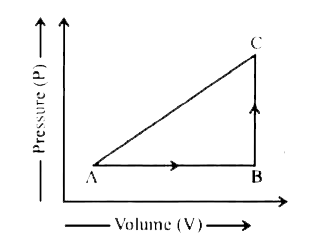110 J of heat is added to a gaseous system, whose internal energy change is 40 j. then the amount of external work done is
150j
70j
110j
40j
The correct Answer is:B
To solve the problem, we will use the first law of thermodynamics, which states:
ΔQ=ΔU+ΔW
Where:
- ΔQ is the heat added to the system,
- ΔU is the change in internal energy,
- ΔW is the work done by the system.
1. Identify the Given Values:
- Heat added to the system, ΔQ=110J
- Change in internal energy, ΔU=40J
2. Apply the First Law of Thermodynamics:
According to the first law of thermodynamics, we can rearrange the equation to find the work done:
ΔW=ΔQ−ΔU
3. Substitute the Known Values:
Now, we substitute the values we have into the equation:
ΔW=110J−40J
4. Calculate the Work Done:
Performing the subtraction gives:
ΔW=70J
5. Conclusion:
The amount of external work done by the system is 70J.
Final Answer:
The amount of external work done is 70J.
---
- ΔQ is the heat added to the system,
- ΔU is the change in internal energy,
- ΔW is the work done by the system.
- Heat added to the system, ΔQ=110J
- Change in internal energy, ΔU=40J
According to the first law of thermodynamics, we can rearrange the equation to find the work done:
ΔW=ΔQ−ΔU
Now, we substitute the values we have into the equation:
ΔW=110J−40J
Performing the subtraction gives:
ΔW=70J
The amount of external work done by the system is 70J.
The amount of external work done is 70J.
Topper's Solved these Questions
Similar Questions
Knowledge Check
If 2 kcal, of heat is supplied to a system cause to change the internal energy of a gas is 5030 J, and external work done is 3350 J, then what is mechanical equivalent of heat?
A41.90 J/kcalB4190 J/calC4.19 J/kcalD4.19 J/calIf 150 J of heat is added to a system and the work done by the system is 110 j. then change in internal energy wil be
A260jB150jC110jD40jIn thermodynamic process, pressure of a fixed mass of a gas is changes in such a manner that the gas molecules gives out 20 J of heat and 10 J of work is done in the gas. If the initial internal energy of the gas was 40 J, then the final internal energy will be
A30 JB20 JC60 JD40 J
The P - V diagram of a system undergoing thermodynamic changes is as shown in the figure. The work done by the system in going from A→B→C is 30 J. If 68 J of heat is given to the system, then the change in the internal energy of the system between A and C is

View SolutionA diatomic gas is heated at constant pressure. If 105J of heat is given to the gas, find (a) the change in internal energy of the gas (b) the work done by the gas.
View SolutionFor a gaseous system find change in internal energy if the heat supplied to the system is 50 J and work done by the system is 16 J.
View SolutionIn a thermodynamic process, pressure of a fixed mass of a gas is changed in such a manner that the gas release 20J of heat and 8J of work is done on the gas. If initial internal energy of the gas was 30J, what will be the final internal energy?
View SolutionIn a thermodynamic process, pressure of a fixed mass of a gas is changed in such a manner that the gas release 20J of heat and 8J of work is done on the gas. If initial internal energy of the gas was 30J, what will be the final internal energy?
View Solution
